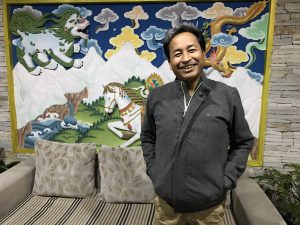Mountain Of A Man

In a future where robots and smart technologies are predicted to take over key jobs, experts say that the jobs remaining for humans will involve the skills that technology cannot replicate, such as critical thinking, innovation, creativity and emotional engagement with other humans.
While governments of major economies are only just starting to wake up to this daunting scenario, one modest innovator in Ladakh has already been doing something about it in a novel experiment that could revolutionise how students learn.
For the last 22 years, Ladakhi engineer Sonam Wangchuk has been running an alternative school in his home state – the Students’ Educational and Cultural Movement of Ladakh (SECMOL) – which uses innovative ways to expose students to real-life skills and empowers them to map their own course. It was founded by him to reform the rigid educational system in the region which lacked relevance to their lives and led to many “failures”. His school’s only criterion for admission is that the students must have failed in the mainstream system multiple times.
The school gives an environment to the students where they can grow, not just in the mind, but also through the three Hs – Head, Hand and Heart. The soft-spoken 51-year old calls this model, ‘Bright Head, Skilled Hands and Kind Heart’. Today, many of the alumni of this “School of Failures” have earned international acclaim in their chosen fields and one is the Education Minister of Jammu & Kashmir.
For a man who has won worldwide plaudits for his work and the prestigious Rolex Award for Enterprise, Sonam Wangchuk comes across as touchingly affable and humble with a palpable passion for what he does. This writer spent a few days interacting with him as a fellow keynote speaker at the Kanchan-Panda Startup Festival, the first such event in Northeast India.
Almost child-like in his candour, the only time he is guarded is when the topic comes up of Aamir Khan’s hit film 3 Idiots, which is loosely based on him. Apologetically he says it “trivialised” his work.

SECMOL had been doing all this work far from the public gaze, but his popularity boomed when Wangchuk helped build the Ice Stupas – a discovery that has the potential to reduce the problem of water shortage significantly in dry high-altitude regions like Ladakh. His seminal work has garnered him many awards including Rs1 crore in December 2016 from the Rolex Award for Enterprise. He is using this as seed money for his dream project, the Himalayan Institute of Alternatives (HIAL), the world’s first alternative university, which is set to open this year.
Education has always been a catalyst in Wangchuk’s life. When he was just 18, he had to fend for himself in engineering college (in Srinagar) because he fell out with his father over his choice of subject. His father wanted him to take up civil engineering but young Wangchuk was set on becoming a mechanical engineer. So he took up tutoring students to pay his way through college. In three months he was making more than enough to pay his entire way through college. Today, his father is proud his son chose his own path.

Here are some excerpts for an interview he gave India Se Media:
India Se: How did you start this change for the education system?
Sonam Wangchuk: After I had this experience of teaching students to fund my own education, I decided to bring reforms to the government school system. After getting my engineering degree, I went back and we started again teaching students in the 10th grade who were facing challenges. But soon we realised we couldn’t be doing this bandage work – repairing broken pieces. If we did that, we would be doing it for another five decades and the system would keep producing broken products for us to repair. So, instead, we decided to bring reform at the very root – rural primary schools. That’s where the children are made to fail or succeed. That was very successful and it took the pass rate, success rate, from 5 per cent to 75 per cent in a decade or so. After that, we started focusing on those that still failed, because why should anybody come out with the feeling of failure after spending 15 years of their life in school? For them, we started a special school, which was all about teaching experientially, hands on, and using more senses than just eyes and ears, like classroom lectures. We wanted it to become unforgettable where they could touch and do things. That led to this school (SECMOL) which is all about engaging young people in solving problems, using what they learn in their curriculum to build applications that can help people in their lives.
India Se: What were the admission criteria?
Sonam Wangchuk: This was a school which had as its admission criteria not percentage, not marks, but failure. So while teaching them maths, science, etc. we would apply it to solve problems. So for solving the problem of cold winters, we, together with our students, apply the chapter on heat in high school science to build buildings that would stay warm in winter using the energy from the sun. These are passive solar mud buildings, which stay at +15 and -15 degrees outside. Similarly for water problems, we developed this “Ice Stupa”, which is a way to store water that goes waste in winter, in the form of ice cones, which do not melt like other ice on the ground, because of this geometric shape – a cone. It stays till June which is when you need water. They stay up to temperatures of 25-30 degrees Celsius.
India Se: How far have you gone in changing the education system?
Sonam Wangchuk: Our work in normal schools we have handed over back to the government, which should be running it. We focus on the failures, so this school year we have come out with flying colours because those who fail and have been rejected have become stars in their own ways. One student who had failed five times became a journalist and then the education minister of the region. Another who had failed four times has become an internationally known filmmaker. There are many (like that).
I am not at all surprised by people who don’t fit into the system because this system is at fault. It is not natural for humans to sit in a classroom for eight hours listening to somebody lecture. In history and evolution we have never learnt this way, never. Only in the last 300 years we have had this school system. No wonder some people don’t fit, and they should not be blamed.
India Se: No, and it’s amazing that the education system allowed you to experiment. Have they absorbed what they’ve learnt from you into their system in any form?
Sonam Wangchuk: There are two levels of experiment they do, one that the government can replicate in government schools, but governments can’t take radical steps, so within the limit of government norms we have done it in the government schools. The more radical ones, we don’t expect most of them to be replicated by the government. What we are now working on is scaling up this experience with an alternative school to an alternative university, which is contextual to the needs of the surroundings. It should address the needs of mountain people, and secondly it should engage the students through experiential learning, so this will be a university where young people will apply what they learn.
Seventy per cent of their time should be outdoors, doing things that solve the problems of people in the mountains. In the case of the school of sustainable tourism, then it will be young people engaged in running tourism projects, running high-end hotels at the university. The same in other departments also where their knowledge is applied. When you apply knowledge hands-on, and these are young people in their 20s, very capable, then you produce wealth. This earning can run the universities, so our vision is a university where students pay, not in cash currency, but in imagination and sweat. They’ll work and working and doing is the best way of learning. Therefore, you get all dimensions.
India Se: So in a way you’re liberating the children from the classrooms, and that’s how they’re learning so much faster, and producing.
Sonam Wangchuk: Exactly! And when they produce wealth why charge them fees? And if you don’t charge them fees then rich or poor doesn’t matter. Everybody gets an equal chance.
India Se: It’s levelling the playing field completely in one go, an amazing concept! So would you then franchise out this concept, because it is actually your own.
Sonam Wangchuk: We like to help people replicate it so the university will actually have a school of education which will actively work in spreading it to other contexts to people who are actually passionate about their regions. You need a person who is passionate to push something that is not so simple as a formula.
India Se: And that is where I think you can’t have it free. People would have to pay for this kind of learning, right?
Sonam Wangchuk: We are not yet very clear (on this). What we think is that at least for students from the region, we should try and make it free. Those who come from other places, depending on the context again, maybe they could be charged, maybe not. If we are able to make an enterprise run that sustains the university, we have no reason to charge the students.
India Se: Speaking of which, I inadvertently said boys, I meant students. What proportion of your students currently are girls?
Sonam Wangchuk: In Ladakh it’s always more girls in education. It’s because boys have opportunities in the army and military and so on where girls don’t go, so they study more. Boys may be inducted into the army at a young age, which is not to say that they’re better off, but yeah, girls get to study more because of that.
India Se: Has that little rift with your father mended – when you chose to be a mechanical engineer instead of a civil engineer and earned your fees.
Sonam Wangchuk: Yes! I always say to young people that it’s not that our parents are mean when they try to impose (on us). Actually, you should take that as a good test of your determination. If you’re not determined, then they’ll prevail and it’s good that they prevail, but if you’re really determined, then you’ll prevail and you’ll be successful also, and they are happy again. So, likewise, after seven years, when I was very established in what I was doing, I heard that he was happy that I was not wrong to choose this. I went and greeted him and we became friends.

